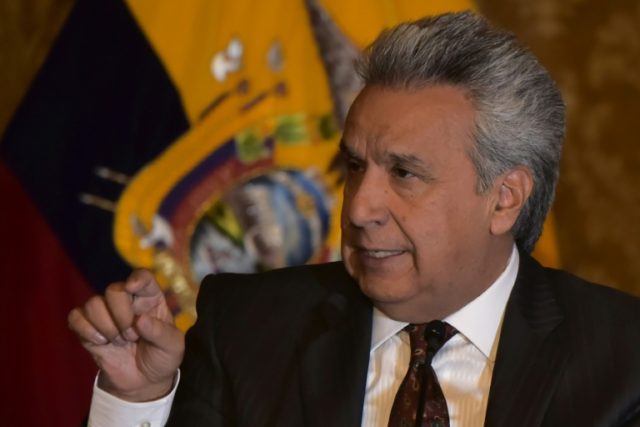Ecuador’s President Lenin Moreno took another step Thursday towards undoing the ties leftist predecessor Rafael Correa fostered with the rogue regimes in Cuba and Venezuela, withdrawing from the Bolivarian Alliance of the Peoples of Our America (ALBA), a socialist alternative to the Organization of American States (OAS).
Late Venezuelan dictator Hugo Chávez established the ALBA in the mid-2000s as an alternative to the then-ascendant capitalist coalition the Area of Free Commerce for the Americas (ALCA). As that group is no longer active, the ALBA serves more practically today as a rival to the OAS and its Summit of the Americas, bringing together the continent’s socialist leaders to plan strategies to diminish the influence of the United States in the region.
Ecuador joined the ALBA under Correa, a staunch ally of Chávez’s. While Moreno ran as Correa’s hand-picked successor and member of the same party, he has spent much of his time in office undoing Correa’s policies. Under Moreno, Ecuador has also filed an arrest warrant for Correa under corruption charges, one Correa has avoided by refusing to return to Ecuador from his newly adopted country, Belgium.
Ecuador cited its “frustration” with a “lack of will” on the part of the socialist government of Venezuela, which leads ALBA, to improve the lives of its citizens, currently living through the worst humanitarian crisis in the history of that nation.
“Only a stable democracy in Venezuela will produce economic stability, which will avoid the continuation of the mass exodus of its citizens,” Foreign Minister José Valencia said at a press conference in Quito on Friday. The crisis in Venezuela – which has resulted in severe food and medical shortages, water shortages, and extreme poverty nationwide – has also triggered one of the largest refugee migrations in Latin American history. Some scholars suggest that, by the end of the crisis, Venezuela’s migrant population will exceed that of Syria’s. While Ecuador does not share a border with Venezuela – it is separated from Venezuela by Colombia – Quito has offered to help aid refugees seeking a way out of the nation.
Valencia placed the blame squarely on Venezuela’s socialist dictatorship, once a reliable ally for Ecuador.
“The exit of Venezuelan citizens from their country is a consequence of the political and economic crisis in Venezuela. The repercussions are regional, however, Ecuador will always stand in solidarity” with Venezuelan citizens, Valencia said, adding that Nicolás Maduro’s lack of response to the exodus was “inhuman” and lamentable.
Maduro has repeatedly blamed the collapse of his state on an alleged “economic war” the United States is waging on Venezuela for attempting to establish a socialist regime and taken no blame for his economic policies. This weekend, Maduro announced a new initiative to boost the economy: the replacement of the bolívar currency with something called the “sovereign bolívar,” whose value he did not specify except to say that it was tied to the value of the “petro,” a cryptocurrency Maduro made up. He also raised the minimum wage 3500 percent, a policy that will likely put the nation’s few remaining merchants out of business.
The policy has triggered a new wave of refugees fleeing into Colombia and Brazil. Both countries lack the proper infrastructure to accommodate the thousands coming in, and Brazilians have begun attacking homeless refugees in border towns. Maduro’s government has not modified any policies to keep Venezuelans from fleeing the country.
The decision to leave ALBA was a “position made on principle,” Valencia added.
#Ahora:
El gobierno ecuatoriano considera que hay falta de acción de Venezuela frente al éxodo de sus ciudadanos. El canciller José Valencia anuncia que se retira de la ALBA. pic.twitter.com/Ad6VxB1w5s— ANA MARÍA CAÑIZARES (@anniecanizares) August 23, 2018
Ecuador’s exit leaves only the nation’s most staunchly socialist nations and the small Caribbean islands that rely on Venezuelan oil in the ALBA coalition, including Venezuela, Cuba, Bolivia, Nicaragua, Dominica, Saint Vincent and the Grenadines, and Antigua and Barbuda.
Moreno, the current Ecuadorian president, has implemented a series of policies since his election last year to reverse Correa’s policies. Ecuador announced this year, for example, that it would stop paying into Telesur, a communist propaganda outlet largely funded by Cuba and Venezuela. Telesur holds the rare distinction of being a left-wing outlet so biased that Facebook removed them from their platform last week.
Moreno’s government has also ordered its embassy in London to remove Julian Assange, the Wikileaks chief Correa offered sanctuary to.
Most notably, Maduro’s government has ordered Correa’s arrest. An Ecuadorian court first summoned Correa to testify in February over a series of oil deals with China that the Moreno government found suspect, resulting in nearly half of Ecuador’s oil supply to go to China in exchange for shady loans. Correa ignored the subpoena, triggering an order of arrest published in July. Correa denies any wrongdoing but remains in Belgium, refusing to travel to his home country and face justice.

COMMENTS
Please let us know if you're having issues with commenting.